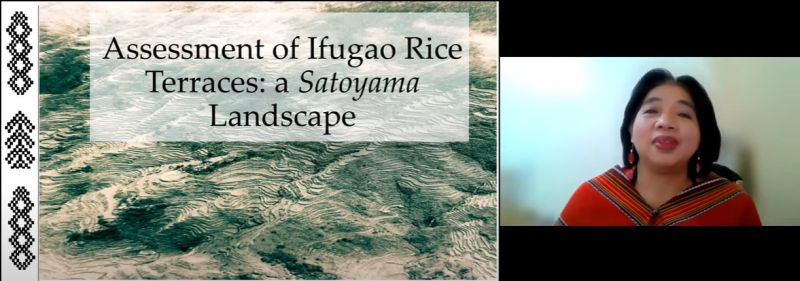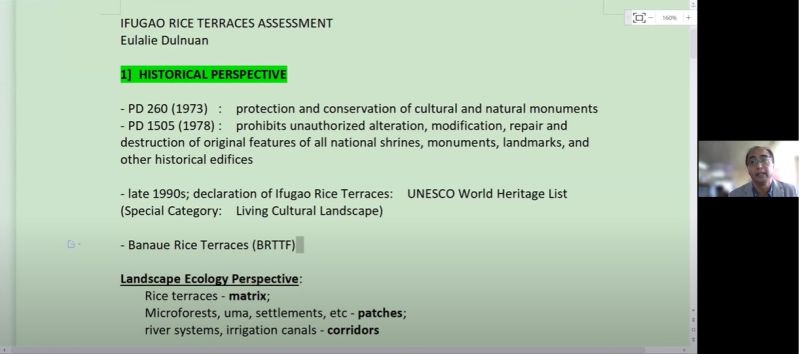The 8th episode of the Revitalizing Socioecological Production Landscapes and Seascapes (SEPLS) Webinar Series titled “Assessment of Ifugao Rice Terraces, a Satoyama Landscape” was held on 27 October 2022 via Zoom.
Ms. Eulalie D. Dulnuan, Supervising Administrative Officer of the National Museum of the Philippines, was the guest speaker. Dr. Romeo A. Gomez, Jr., Professor of Ecology and Environmental Science of Benguet State University, served as the guest discussant. Ms. Anne Frances Buhay from the Faculty of Management and Development Studies (FMDS) of the University of the Philippines Open University (UPOU) hosted the virtual event.

Ms. Dulnuan clarified the need to consolidate relevant researches pertaining to the Ifugao Rice Terraces (IRT) and combine these initiatives so that conservation efforts will not be disjointed. She shared that the Japan Satoyama-Satoumi Assessment (JSSA) was used as the basis for the Ifugao Rice Terraces Assessment (IRTA). She discussed the four integral parts of IRTA, namely, looking into the current conditions and trends, determining the drivers of change in biodiversity and ecosystem, identifying the responses to the changes of the landscapes, and gauging the future.
The guest speaker revealed that the worrisome trends and state of the IRT were due to the change in cultural values, disintegration of rice culture, introduction of new rice varieties and species, increasing presence of invasive species, poor monitoring and law enforcement, and change in land use, among others. She mentioned that several national and local policies have been enacted for the preservation and restoration of the IRT, but the implementation of these policies remains a big challenge.

Dr. Gomez provided his perspectives and highlighted the important points tackled in the discussion. He emphasized that the inclusion of the IRT in the UNESCO World Heritage List was an impetus that placed the IRT into great focus and worldwide attention. He stated that being listed in the special category of Living Cultural Landscape is a confirmation that the IRT is something that can be experienced and is not simply a relic of the past. He added that the IRT is not just a wide ecosystem, but rather a landscape due to the expanse of the area, which is mainly composed of rice paddies.
The guest discussant agreed that there were disjointed attempts to restore and manage the IRT when it was declared as a UNESCO World Heritage Site, and that the IRTA played an important role in unifying these initiatives towards IRT conservation. He recommended capitalizing on biodiversity, which is at the core of the Satoyama-Satoumi Principle and other related frameworks, as it can provide ecological and economical flows.
An open forum followed the presentations. Concerns were addressed by the speaker and the discussant, such as outmigration, shifting of traditional rice varieties (TRVs) into high-value vegetables, convergence strategy, management structures, and essentials of nationally important agricultural heritage systems (NIAHs), to name a few.
The webinar series was organized by Project 1 of the Emerging Interdisciplinary Research (EIDR), Building Climate Smart Communities (bSMART) Program and implemented by UP Open University and UP Los Baños. The initiative aimed to raise awareness on the conservation and sustainable use of SEPLS through the series of online talks on Satoyama-Satoumi principles and associated practices as approaches to sustainable management and biodiversity conservation.
The SELPS webinars can be viewed at the Philippine Satoyama YouTube channel and Facebook page.
Written by Jaime Guimbao
Edited by Myra C. Almodiel and Anna Cañas-Llamas








